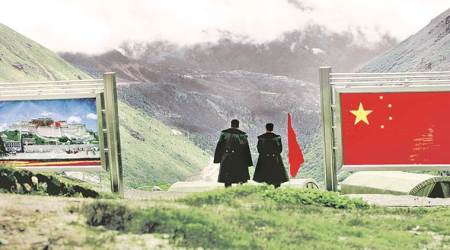 In practical life, many believe that friendships ought to be kept far away from the formal structures of family and romance. (Illustration: Subrata Dhar)
In practical life, many believe that friendships ought to be kept far away from the formal structures of family and romance. (Illustration: Subrata Dhar)
Sofia Coppola’s 2003 film Lost in Translation is a portrayal of an unusual friendship between an ageing actor and a writer in the crowded streets of Tokyo. As they eventually part, Bob whispers into Charlotte’s ears, something which is inaudible to the audience: “Are they never going to see each other again?”
All too often, in the mid-twenties to thirties, our friendships are in crisis. The idea that romantic love and marriage are an inherently superior kind of human engagement, when weighed against the necessarily amorphous, informal nature of friendships, influences even the most open-minded people. But even as you prioritise marriage and family, what do you lose out on? The runaway success of Elena Ferrante’s Neapolitan novels, which are masterful psychological examinations of female friendships, holds some answers. In India, the 1990s soap opera, Tara, was an ahead-of-its-time success story in this regard (if you liked HBO’s Big Little Lies, perhaps, a trip down memory lane is in order).
The adage “old friends get better like old wine” is hailed in literature and cinema. In practical life, however, many believe that friendships ought to be kept far away from the formal structures of family and romance. The butchering of older ties is seen as a prerequisite for starting a new, coupled life. “Marriage changes everything”, “friends are friends and husbands are husbands” — such ideas add up to an unassailable wall, marooning friends on either side.
My oldest friend from school broke off all contact with me after he married. He had once told me in anger, “I am not abnormal like you. I’ve got real work and friendships have little to do with procuring my daily bread”. Indeed. But I can flip that around, too: work has little to do with friendship, or love, or all of the other things that make our prison sentence on this planet worthwhile.
Many of us fall into the 21st century trap of “industrial time” — the need to evaluate every passing minute on the basis of “productivity” or “output”. Back when my friend was 10 years old, he wanted to learn cross-stitch with me. It was in those classes that we made a riot of memories. I saved those stitches and counter stitches to gift him a shawl when he would be old — that used to be our teenage joke. Gradually, I realised that my friend needed neither my warmth nor my shawl. Maybe, if you were to ask him today, he would answer, “We naturally outgrow old friends. Besides it’s stupid to think that friendships last forever.”
Some of my female friends also changed cities, relationships and embraced newer roles. But it is different for women. In most traditional idioms, proverbs, songs and gossip, a woman is often reminded that everything, apart from her husband’s family, is a “secondary” tie. Is this why, in every wedding, the bride’s friends cry their eyes out during the bidai? Is this only clichéd heartbreak or are the tears real? In many cases, friendship is a downhill slope from that point onwards.
Certainly, one takes many permanent steps to adulthood, but it takes courage to fight imaginary restrictions of social ties. S, 27, tied the knot four years ago; her wedding was fixed in a week’s time. She had left home to prepare for the exams when the surprise was sprung on her. Not only did she skip the exams, but she never returned to our hostel again. I did try her number a few times but there was no response. One summer, I bumped into her brother who mentioned casually that S is now fully a “domestic” person, with barely any time for herself. What troubled me was not S getting a headstart on her nuptial life, but how her brother educated me and tried to convince me about the end of our friendship. He knew the script and its longevity all too well.
Over the years, these unacknowledged ruptures leave a void, difficult to fill. It’s inevitable, many tell us. But that is often the excuse for not willing to accept that friendships can be as strong and as sustainable as other relationships. That they can be ends in themselves, and not simply a means to our ends.
My senior in school remembers how her friend severed all ties with her after his marriage. His family members were not “comfortable” with the idea of an unconditional friendship between them. Estranged and out of contact, she says, “I still think it could have been possible to remain friends for life, but I can say that only from my end. I also realise that I am the one who lost the most. He has, too, but he made the choice to — I didn’t.” When a friendship dies suddenly and arbitrarily, one is left to contemplate the end of all that it was — and all its possibilities, now lost forever.
I admit, unlike Thoreau, I have not spent sleepless nights pondering over the possibilities of friendship. But, I do agree that like art, it can be limitless. Perhaps, this is why I belong to a small cluster of people, who now witness the decline of difficult and engaging friendships that reap no “fruit”. On days when I do fret over friendships lost, Coppola’s Tokyo lights coalesce inside my head. I feel like I know what Bob told Charlotte in the end. I think he urged her to flee from the night lights with him, hand in hand. They would live somewhere unobtrusive, away from the crowds that bring in more loneliness by the day. The lights would show them the way.

